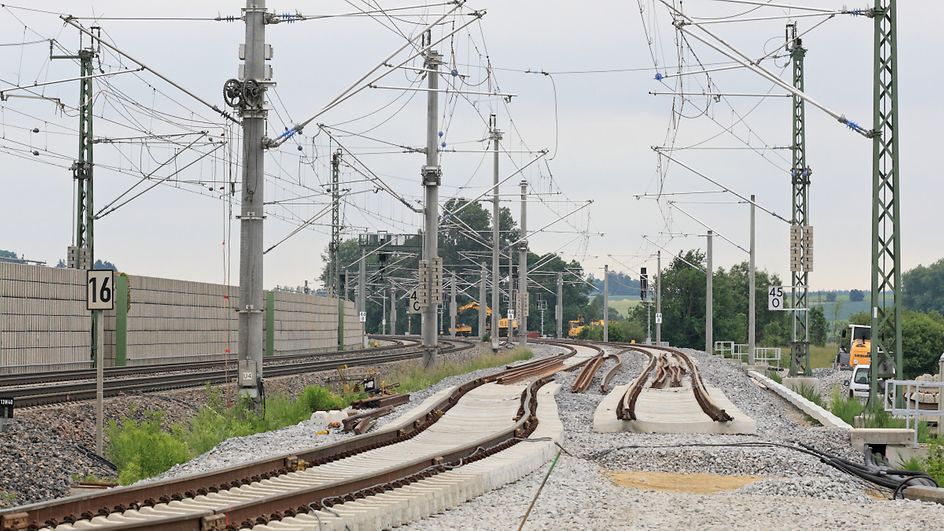 The Federal Ministry for Digital Affairs and Transport (BMDV) announced a budget allocation of EUR 12.5 billion for German railways from the Climate and Transformation Fund (KTF, Der Klima- und Transformationsfonds) as a priority to this “climate-friendly transport mode.”
The Federal Ministry for Digital Affairs and Transport (BMDV) announced a budget allocation of EUR 12.5 billion for German railways from the Climate and Transformation Fund (KTF, Der Klima- und Transformationsfonds) as a priority to this “climate-friendly transport mode.”
According to the BMDV, this sector has been “neglected considerably in the past decades” resulting in an “immense investment backlog” that will require an additional funding of up to EUR 45 billion by 2027.
In the draft budget for 2024 and the financial planning for the period up to 2027, the ministry has already earmarked an additional EUR 11.5 billion for German railways.
In addition, Deutsche Bahn is making its own contribution of EUR 3 billion, financed by a loan on the capital market. “We are also examining whether additional funds can be made available to DB AG via an equity increase to reduce the investment backlog,” BMDV says.
Due to a decision by the federal government in 2019, the equity of DB AG will be increased by EUR 1.125 billion annually by 2024 to finance the basic rail infrastructure and digitalisation measures. In this respect, the Federal Government will promptly start talks with the EU Commission as to whether additional funds can be made available through further equity measures. “We will do everything we can to continue the massive investment ramp-up in the coming years, with the goal reinforced in the coalition decision of March of making up to EUR 45 billion more available by 2027,” the ministry says.
According to the Federal Minister Volker Wissing, with the financial commitment, “we are moving the rail transport to where it belongs: at the center of modern, sustainable and good mobility. An efficient, reliable, modern, digitized rail network is a prerequisite for goods transport to be reliable and punctual and for people to enjoy traveling by train.”
The ministry plans that in September will invite railway and construction industry to discuss the way these funds can be used in the most efficient way in order to quickly achieve noticeable improvements for passengers and freight transport customers.
Deutsche Bahn is currently working on the modernisation and renovation of the core network. Of the more than 38,000 km of German railways, almost 34,000 km are managed by DB, including the main corridors, which “have been neglected for decades”. Because many opened construction sites, the corridors cannot be fully utilized.
In addition, under the Deutschlandtakt, country’s integrated regular interval timetable, Germany plans to build 1,000 km of new railway lines to meet traffic demand and punctuality.
In October 2022, BMDV announced that to implement the Deutschlandtakt, there are planned new measures to be implemented with an estimated investment of EUR 26 billion for the North-West. This includes, among others, the axes Münster – Lünen, Hanover – Hamburg/Bremen, Hanover – Bielefeld, Hamburg – Lübeck – Puttgarden, Brunsbüttel – Wilster as well as the hubs Cologne, Hamburg and Hanover.
According to the report of DB for the first half of 2023, published in July, DB’s construction and modernisation projects are “record levels throughout Germany”, causing the decrease of punctuality. In in long distance rail transport, the punctuality fell to 68.7% in the first half of 2023, down from 69.6% in the first half of 2022. “Although we are asking a lot of all stakeholders at the moment, the infrastructure is the key to sustainable improvements for our customers,” Richard Lutz, the CEO of Deutsche Bahn said.
DB spent considerable funds up front in the infrastructure in the first half of 2023 including much more on maintenance. The company increased its net capital expenditures from its own funds by 13.1% to EUR 3.1 billion in the first six months of 2023, “the most ever invested in the first half of a year.” Gross capital expenditures by DB and the German Government were up 16.7% to EUR 6.3 billion, which is also a record. More than 90% of all funding has continued to go toward rail operations in Germany, including for tracks, stations and new trains.
Share on:



